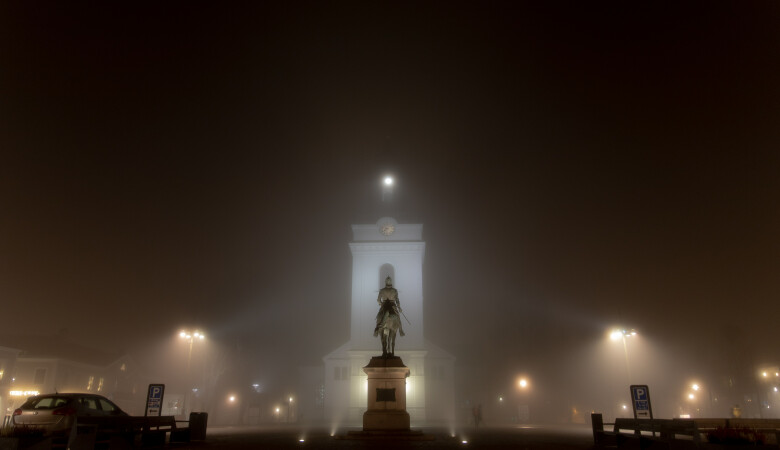God's Anger at the First Dark Exchange: Idolatry (Romans Sermon 6 of 120)
February 13, 2000 | Andy Davis
Romans 1:18-23
Idolatry
This morning we're going to be looking at verses 18-23.
"Nearly all the wisdom we possess, that is to say, true and sound wisdom, consists of two parts: The knowledge of God and of ourselves." I'll read that again: "Nearly all the wisdom we possess, that is to say, true and sound wisdom, consists of two parts: The knowledge of God and of ourselves." With these words, a French refugee, 27-year-old French refugee in the middle of the Protestant Reformation, began the Institutes of the Christian Religion, John Calvin. And he's right. It's amazing that a 27-year-old can get it that right, but it is possible, especially one whose mind was so saturated with the Word of God. Now, this expression that I've given you talks of true and sound wisdom; that implies there is something the opposite, which we would call foolishness. The key to it all, therefore, is understanding God properly and understanding ourselves properly. We need to know God the way He really is, not some false understanding of God, not some idol. We need to know God truly.
And not only that, but we need to know ourselves properly. And what is the source of this information? Where are we going to find it? I would contend in the Scripture alone. And I would say that Romans Chapters 1, 2, and 3, gives us as clear a view of both God and of ourselves, as we need in this age. We need to hear this message. There are going to be some things in these chapters that are difficult for us to hear. It shouldn't surprise us, because it's coming from outside in. It's coming from a supernatural source down to us, and therefore, it's going to be unusual. It's going to sound different. It's going to come with power, and it's going to transform the way we think about God and ourselves.
As we look at God, we have the tendency to construct God the way we like Him. What would you call it, if somebody puts God together out of the construct of their own imagination, puts God together, and then worships what they put together? What's that called? Idolatry. Idolatry. And the Book of Romans was given to sweep away idols, to give a true and right perception of God. And what is it called when we look at ourselves, and we deal very lightly with our own transgressions, lightly with our own sin, but deal in the worst possible way with the sins of others? That's pride. That's pride. Well, this Scripture sweeps both away. Now, as we go into the last half of Romans Chapter 1, and then into Chapter 2, and Chapter 3, culminating with a verse that all of you know, Romans 3:23, "For all have sinned..." And you'll understand it this way, "For all have sinned and fall short of the glory of God." I have a different translation, "For all have sinned and lack the glory of God." You know that verse, but there's an awful lot of verses that lead up to it. There's a whole discussion of who we really are, and we need to hear it, so that we understand God properly, and we understand ourselves.
But as we move into this section, it's amazing. There's a danger here of self-righteousness. It really is shocking what our minds, our souls can do to Scripture. We see described here in the first half of this section, idolatry. And then, in the second half, we see described homosexuality. We say, "I'm not an idolater and I'm not a homosexual, therefore, I'm free." You have to see yourself in Romans 1 and you will, when we get done, when there's a list of 21 sins at the end of Chapter 1, and gossip and slander is right next to murder. You'll see yourself, I hope. We're all in here. We must not twist the truth that comes to us. We must not let ourselves get off the hook. We're on a hook. I want to know about it. I want to know what kind of hook it is. And I want Scripture to show me the way out. I want to understand truly. We are not to be self-righteous. You, therefore, have no excuse, you who pass judgment on someone else. For at whatever point you judge the other, you're condemning yourself, because you who pass judgment do the same things. And so it is as we begin this section, which is a diagnosis of the human heart in its natural state apart from Jesus Christ.
I'm going to begin this morning at verse 16, although our discussion begins at Verse 18, "I am not ashamed of the Gospel, because it is the power of God for the salvation of everyone who believes, first for the Jew, then for the Gentile. For in the Gospel, righteousness from God is revealed, the righteousness, that is, by faith, from first to last. Just as it is written, the righteous will live by faith. For the wrath of God is being revealed from Heaven against all the Godlessness and wickedness of men, who suppressed the truth by their wickedness, since what may be known about God is plain to them. Because God has made it plain to them, for since the creation of the world, God's invisible qualities, His eternal power and divine nature, have been clearly seen, being understood from what has been made, so that men are without excuse. For, although they knew God, they neither glorified Him as God, nor gave thanks to Him, but their thinking became futile and their foolish hearts were darkened. Although they claimed to be wise, they became fools, and exchanged the glory of the immortal God for images made to look like mortal man, and birds, and animals, and reptiles."
I. Review: The Gospel is the Power of God for Salvation
Now, verse 16, Paul describes the Gospel of God as, "The power for the salvation of everyone who believes." We've talked about this for two weeks; the Gospel is powerful, isn't it? The hearing of this message can transform someone from being an object of wrath, under the judgment of God, to being an object of grace, seeing God face to face in Heaven. That's a powerful message. It's an incredible message and the Gospel is that message. Last week, we talked about why it is the power of God. It is the power of God, because in the Gospel, there is a righteousness from God, which He holds out to us as a garment to put on and it will shield you. It will cover you on judgment day; it is the only garment that will. There is no other righteousness which will cover us on judgment day. The beauty, the joy of the Gospel, is that the very righteousness that God will demand from us on judgment day, He provides us freely, if we will just believe the message. That's incredible.
Now, verses 16-17 lead into verse 18. In some translations, there isn't the little connective words that we need, like in the NIV. They leave out the word 'for' at the beginning of verse 18, but there is a connection: "The righteous will live by faith, for the wrath of God is being revealed from Heaven against all the Godlessness and wickedness of men." There is a need for this righteousness, because the wrath of God is coming. Last week, I talked about this to some degree. I said that, "The righteousness of God is both our greatest threat and our only salvation," you remember that? The righteousness of God threatens us, because there is no one righteous, not even one. We are not righteous in ourselves, and therefore, we are threatened on judgment day. It's a great threat and it took a great salvation to save us from it, didn't it? Jesus dying on the cross, pouring out His life, His blood, so that we might avert the wrath of God, that we might survive judgment day. And so there's a direct connection between the phrases. The righteous will live by faith, for the wrath of God is being revealed. The only way you're going to survive the wrath of God is this Gospel message. It's the only salvation. It's the only way.
II. The Wrath of God: God’s Passionate Response to Evil
Now, as we come to this topic of the wrath of God, we come to that, which is a very unpopular topic, very unpopular, and I risk the danger of being called a "hellfire and brimstone" preacher. Frankly, I've never heard such. I've heard of them, but I've never actually heard that kind of a sermon. I think preachers have been intimidated out of it. Well, I'm not going to preach a "hellfire and brimstone" sermon, in that there's no hellfire and brimstone, actually, in these verses, but I am going to preach the wrath of God. The wrath of God is here and there is a coming wrath that we should be afraid of, we should flee from it. And it is my purpose today, that you be as afraid of it as God means for you to be. That's my desire. We trifle with the things of God. We think lightly of them. And it's a pleasure to hear a preacher that tells stories and does other things that are entertaining, but that's not my purpose today. My purpose is to bring your minds into that which is weighty, and heavy, and serious, that you may take it seriously. It may be that there's somebody in this room who will look back on this day and thank God for it on judgment day, because they dealt properly with the wrath of God.
What is the wrath of God? You know, there was an ideal picture of God in the Greek world, that God was a dispassionate... That means unfeeling, unemotional, thinking machine. That's what God was to the Greeks, the purest, highest ideal of God, that He was a thinking, logical machine, no passion at all, no feeling. I don't know why they came to that conclusion, except that they saw the damage of human emotion, specifically human anger, human lust, and desire. They said, "Well, none of that can be part of God." But they never stopped to think that all of those things in us are actually twisted perversions, because of sin, but they have a reflection in the personality of God. Our God is a passionate being, is He not? Oh, He's an emotional being. He is passionate. You look at it and you see all the different ways that God reveals His passion. He rejoices. He rejoices. He is grieved. Grief is a strongly emotional state, isn't it? He is grieved at sin. He laughs at rebellion, Psalm 2. He is compassionate. Our God is a compassionate being.
What does compassionate mean? It means to link your passion with somebody else's passion. It means to rejoice with those who rejoice, to mourn with those who mourn. God does that. Why do you think Jesus wept at Lazarus's tomb? Why did He cry? Because He was compassionate to those who are going to weep at many such tombs throughout all history. He feels it. He's a compassionate being. Therefore, He's a passionate being, isn't He? He's an emotional being and that includes anger.
Now, this is uncomfortable for us, because human anger is so often polluted. It's an evil thing. If you were to take a survey of your own anger, just keep track of it over the next two months, and draw it back with, as best as you can, an honest assessment, and say, "Why did I get angry there?" You'll find self at the root of much of it, if not all. "This person has inconvenienced me. They have put me out. They have insulted my pride, and therefore, I'm angry." That's not God's way of being angry. God is angry, because of love. Understand this. Understand this. And God does not just love people. He loves righteousness. He loves holiness. He loves what is good and pure. We think, "Oh, God's love and His wrath are mutually exclusive." No, God's love is more than just to people. He loves holiness. He loves what is good and right. And therefore, He has a passionate response to what is evil. He hates it, absolutely.
God's wrath is His passionate response to what is evil and what is unrighteous. The problem for us, is that we are evil and unrighteous. And therefore, naturally, apart from the salvation that Jesus gives, we are under the wrath of God. He is angry with us. He's angry with sin. Is that not what it's saying here? "The wrath of God is being revealed from Heaven against all the Godlessness and wickedness of men," of people, people. The wrath of God is directed toward individuals. And so, if we are not in Christ, we're under wrath, it's just that simple. John 3:36 says that whoever believes in the Son comes out from under the wrath of God. We come out from under it.
Now, Romans 1:18 says that, "The wrath of God is being revealed from Heaven." It's presently being revealed. This is a very deep idea. What comes in the next number of verses, from 18-32, is a pouring out of all kinds of evil: Idolatry, homosexuality, a list of 21 evils and sins at the end of this chapter. And all of this is evidence of the wrath of God, and we'll understand that more. It's not just that which produces the wrath of God, it is actually the result of the wrath of God. He sees that we harden our hearts, He sees that we sin, and He gives us over to drown in whatever swamp we choose; that's the wrath of God. It's presently being revealed. And how is it revealed? It is revealed in the evils of this life, in sickness, in poverty, in suffering, family break-ups. It's also revealed in being given over to sin, addictions, perversions, all of this evidence of the wrath of God.
It's revealed in death, for death is the righteous punishment of God for sin. More than anything, it is being revealed in this Gospel message. When you get done today, you'll understand the holy and righteous response of God to sin more clearly. Why? Because He told us about it in Romans, in the Gospel. The wrath of God is revealed in the Gospel message. Do you understand that, in the cross, the love of God for sinners and the wrath of God against sin come together? They're both there in the cross, both the love of God, the compassion of God for sinners like you and me, and the love He has for righteousness, which the flip side is the wrath of God against both, come together in the cross, revealed in the Gospel message. But the Gospel message also speaks of a future wrath, doesn't it? There is a wrath to come. The wrath of God is presently revealed and there is a wrath which will come in the future. Matthew 3:7 and John the Baptist talked about this: "When he saw many of the Pharisees and Sadducees coming to where he was baptizing, he said to them, 'You brood of vipers, who warned you to flee from the coming wrath'"? Who warned you to flee from the coming wrath? For such, you should be doing. I'm just wondering who warned you to do it? There is a coming wrath. And the only way to escape this coming wrath, the only way, is repentance, and faith in Jesus Christ; there is no other way.
Suppose you were in the Middle Ages, and you were in a city, a walled city, and an enemy had surrounded the walls, and it looked like they were going to win. They were going to conquer the city. It wouldn't be long before they were running through the streets of your city. And suppose someone came to you with a sense of urgency, and said, "I have a way out, a way of escape to get out of this city, which is about to fall. Will you come or not? It's a tunnel. They haven't found it yet. It'll bring us up to those hills up there. Will you come?" Imagine a person who would stand there and say, "Well, why aren't there two escapes? Why aren't there two? I'd like to choose from one or the other. I don't want the one you're offering. I'd like another one. Why aren't there 10, as a matter of fact?" Would you do that? You would say, "Show me the door. I want to go. I want to escape." And so they run for that one door. And so it is with salvation. There is a way of escape from the wrath of God. You must flee to that way. That way is Jesus Christ.
It says in Romans 5:9, "Since we have now been justified by His blood, how much more will we be saved from God's wrath through Him?" That is future tense. I don't mean to give you an English lesson, but 'will' or 'shall' leads to the future tense. There is a wrath to come. There is a judgment to come. And if you'll have faith in Christ now, are justified through faith in His blood, you will be saved on that future day. And that is a great, and an awesome day. I can't even describe it to you, when all nations will be gathered before that throne, and He will separate them, one from another, as a shepherd separates the sheep from the goats. And where will you stand on that day? What will save you on that day? The Blood of Jesus Christ alone. And will you quibble, and say, "Why weren't there two or three ways of escape?" He will say, "You heard, you knew. You knew."
There is a salvation from the wrath to come. And you can say, "There is no wrath to come." You can say that. But God has said, "There is a wrath to come." And it will come. First Thessalonians 1:10, it says that, "Jesus rescues us from the coming wrath." Is that sweet for you, as a believer? It should be. "Jesus rescues us from the wrath to come." He is our salvation.
III. The Cause of Wrath: Wicked Suppression of Truth Resulting in Failure to Worship
Now, in this verse, what is the cause of the wrath of God? I say it is the wicked suppression of truth, resulting in a failure to worship. A wicked suppressing of truth, resulting in a failure to worship. Now, there are steps to the argument that Paul brings us through. What I'm going to do, is I'm going to go to the conclusion and I'm going to work back. The conclusion is that all people are without excuse and deserve the wrath of God. That is his conclusion. All people are without excuse and they deserve the wrath of God. Step back from that. Why? Why do they deserve the wrath of God? Because they do not glorify God, nor do they give Him thanks. That's why.
Alright, then, Paul, why are they without excuse? That's why they deserve wrath. Why are they without excuse? They are without excuse, because it is not from an ignorance, an innocent ignorance of God, but in spite of sufficient knowledge about God, which is available to us. One step back from that, God has made it available to us. He has made it plain to us. Those are the steps of his reasoning. Let's work from the front then. It says, "The wrath of God is being revealed from Heaven against all the godlessness and wickedness of men, who suppress the truth by their wickedness." Suppress the truth. I get the image of one of those low budget Japanese invasion movies, and there are these hideous monsters in the subterranean parts of the city, and they want to push up through the sewer hole covers, the manhole covers, and pop up, and take over the city. And there are some people who are running around trying to push this hideous thing back down under the ground, so that it would not come up and trouble us. That's the way they look at the truth of God.
That's the way they look at it. They are suppressing it, pushing it down, as though it were something horrible, which is pushing itself up into their minds. And that makes God angry, that His person, His truth, His character is dealt with that way. That's what makes Him angry. Now, We suppress the truth it says, "In unrighteousness." Do you know that no infant comes into the world with a loyalty to the truth? Think of it this way: Have you ever met an infant with loyalty to truth? What does an infant come into the world with loyalty to? Me. Right? Me! An infant comes in the world with a tremendous loyalty to me. You have to learn loyalty to truth, don't you? And so, once the truth comes in, we begin to suppress it, we begin to twist it, push it in unrighteousness. We become what's called, in the political parlance these days, spin doctors. What is a spin doctor?
Have you ever watched a political debate on television, and after it's over, there are these professional people who sit down in their suits? And they sit down, and they tell you what to think. Have you noticed that? They tell you, "Well, you know, when he said this, it didn't mean what it seemed to mean. What it meant was this, and that, and therefore, it fits into his whole plan that he's been explaining now for the... " Oh, on and on. This is spin doctoring, is what it is. It's twisting the truth, rearranging it, so that we think of it a different way. We're all spin doctors, every one of us. When the truth of God comes in, we begin to twist it, rearrange it, adjust it, so it fits where we are, and that's called suppression. We're suppressing the truth in unrighteousness.
Well, what truth are we suppressing? Verse 19 says, "Since what may be known about God is plain to them." It's a truth about God that's being suppressed. Well, what truth about God? Romans 11:36 says, "For from Him, and through Him, and to Him are all things. To Him, be glory forever and ever. Amen." Well, there's some truths in there that could be suppressed. God the creator, from Him are all things. God the creator: I was made by Him; He made me. God the commander. God the commander: He has authority over me and can tell me what to do. God the sustainer: Everything I need for life, and breath, and health, and everything, comes from Him. I'm on a welfare state situation here. I'm dependent on Him for everything. And then, finally, God the judge: God gives me this freedom to make decisions, and in the end, He's going to judge me for them; He's going to assess me on this thing called judgment day. I don't think I like any of that. It's very uncomfortable to me. God the creator, God the commander, God the sustainer, God the judge. Suppress. Twist. Push. I don't want it. I don't want it.
Well, how is it we know about this? In Verse 19-20, it's God's self-revelation, "Since what may be known about God is plain to them, because God has made it plain to them. For since the creation of the world, God's invisible qualities, His eternal power and divine nature, have been clearly seen, being understood from what has been made, so that men are without excuse." "What has been made," the Greek word for that is 'poiema.' 'Poiema,' what English word do you hear in that? 'Poem.' What surrounds you is a poem. Think about that. A poem of creation surrounds you, a poem of the character of God. It doesn't just surround you, it surrounds stone age tribes in Irian Jaya too. It surrounds everybody. A poem about God, what He has made.
Now, there is a long history of the argument of the existence of God from creation. Long history: Medieval scholars Thomas Aquinas, Peter Lombard, and others, came up with proofs of the existence of God that were very neat, and very clean, and very logical. I'm not going to bring you through them, but then came a brilliant man, Immanuel Kant, who just shredded them. Just shredded them and showed that they weren't worth their paper they were printed on. Very interesting. Well, Immanuel Kant did prove that the existence of God is not logically inescapable. There is a way out, logically. But it is morally inexcusable to take that way. Do you see what I'm saying? We know there is a God. We know it. We can do little games. We can turn little twists of the phrase. We can be Immanuel Kant, be amazed at our logic and shred arguments, but in the end, everyday, we get up, we look around, we know inside there is a God, and we suppress that truth. We don't want it, but it's there; we can't get rid of it. And no one will be able to say on judgment day, "It never entered my mind that you existed. I never even thought that you could have been here. It never occurred to me." No one will say that on judgment day. They knew.
Well, how do we see it from creation? We see God's immensity in the Heavens. We see God's consistency in the regularity of the sun and the physical laws that are around us. We see God's love and His daily provision for us. We see God's power in so many ways, whether a thunder and lightning storm, or an earthquake, a hurricane; we see His power. We see God's inscrutability from the mysteries of the atom. There are things that He will never tell us about this creation. And we see God's wisdom in our own bodies, fearfully, and wonderfully made. We see these things. The invisible qualities of God, they are there. We should all of us, as I said in my series in Genesis, be scientist worshippers, not worshipers of science. No, scientist worshipers. We study things and say, "Oh, what a great God you are. What an awesome God you are."
I was in the middle of writing this sermon, and I took a break, and I reached back for a magazine with lots of pictures in it. I like pictures when I need a break. So I was reading this and it was, I've talked about it before, the hundred greatest men and the hundred most significant events of the last thousand years. And one of them, the picture was of a pile, a huge pile of old tires. Old tires. And I thought, "What is this?" And the event was the discovery of vulcanized rubber by Charles Goodyear. Now, you've heard of Goodyear tires and all that. Well, this is what Charles Goodyear said. I was just taking a break from this sermon. God wouldn't let me take a break. Charles Goodyear, this is what Charles Goodyear said about rubber. This is a quote from Goodyear on rubber, "Who can examine it and not glorify God?" Isn't that amazing? I said, "Lord, that's going to be in my sermon! Who can examine it and not glorify God? It stretches, you can do things with it, it's incredible. Praise you, God. Praise you. Be a biologist or a physicist worshipper of God, because God made it.
But yet, in science today, there's a great suppression going on. Did you know it? A pushing down of the truth. "We don't want it. There's no research dollars in it, no grant money in it, so we're going to suppress it, we're going to push it back." Darwin's theories, evolution, natural selection, time plus chance, billions and billions of years, that's where it all comes from. Now, listen to these quotes. And as I read these quotes, tell me if you can think of suppression of truth when I read them. Richard Dawkins, who is a leader of Darwinian thought today, says this. Listen to this, it's incredible, "Biology is the study of complicated things that give the appearance of having been designed for a purpose." That's an interesting definition of biology: "Biology is the study of complicated things that give the appearance of having been designed for a purpose." Francis Crick, Watson and Crick, the DNA double helix structure, won a Nobel Prize. Francis Crick says this, "Biologists must constantly keep in mind that what they see was not designed, but rather evolved." Why do they have to constantly keep that in mind? Because there's so much evidence to the contrary. They see it in the lab, they see it day after day, the closer they look, it's there. And they have to suppress it, they have to push it away.
Michael Behe, in his book Darwin's Black Box, talks about the bacterial flagellum, of which you have a picture in your little... Do you see it? You wonder what this was? "What in the world does this have to do with Romans?" Well, I can't understand all this. All I know is that this is living. Everything you see here, this is not the structure of some kind of motor in a new boat that is being made for recreation or whatever, this is a living thing. Cells arranged looking like a motor, looking like an O-ring, looking like the stator of a motor and the rotor of a motor. This is the flagellum of a bacteria. And we must constantly keep in mind that what we see, though it gives the appearance of having been designed for a purpose, was evolved.
Do you see this? Suppression. Suppression. But it's not just scientists who do it. We do it everyday in our hearts. We do it morally. We resist the truth of God. We don't want Him in our kitchen, we don't want Him at our dinner table, we don't want Him in our bedroom, we don't want Him when we're on the internet, we don't want Him in the way we live our lives. We don't want Him here. And so we push the truth out. We suppress the truth in unrighteousness. Verse 21 says... This is what we should have been doing... "Although they knew God, they neither glorified Him as God, nor gave thanks to Him." That's what we should be doing. We should be glorifying God and giving thanks to Him for what He's made, but we don't do it. "And then their thinking, they became futile, and their foolish hearts were darkened."
To glorify God means to prize Him above all things. "For the Earth will be filled with the knowledge of the glory of the Lord, as the waters cover the sea." To prize Him as having created, and it's glorious, and to give thanks to Him. Giving thanks is a form of worship, "Thank you, God, for my life. Thank you for my food. Thank you for everything; it comes from you. I praise you God, by giving you thanks." That's what we should have done, but we don't like it. We're on welfare. We don't want to receive this way all the time, and so we resist. And not only that, but there is a drive inside us to worship, isn't there? There is a drive and we can't deny it, so we're going to worship something. And what is it we're going to worship, if we suppress the truth? We're going to worship an idol. We're going to make a new God, one that fits the way we like it. We're going to make the first dark exchange: Idolatry.
IV. Result of Failed Worship: The First Dark Exchange… IDOLATRY
The end of all this, folks, is not atheism. It isn't; it's idolatry, worshipping a created thing. We will worship something. God gave us our minds, our thinking ability for worship, for worship. That's why He gave us the ability to think. That's why we honor and glorify God more than anything else that's created around us, because we can think. And once that thinking becomes perverted, because of this dark exchange, we exchange the glory of God for something created. Oh, what a loss! Our thinking becomes twisted. We become lower in our thinking.
Perfect example of this is Nebuchadnezzar. King Nebuchadnezzar, Daniel Chapter Four, a great story. Just read it with my kids the other day. One day, Nebuchadnezzar is walking, taking a tour, looking out over Babylon, and this is what he said, "Is this not the great Babylon, which I have created as my royal palace, for the display of my majesty and glory?" Don't you want to be sick as you listen to that? "Look what I've made. Isn't it great?" This is worship, folks. It is worship. Nebuchadnezzar was having a worship experience, but he was worshipping himself. And at that moment, a voice came from Heaven, "Judgment." But gracious judgment, seven years, his mind would be changed to that of an animal, and he would live outside day and night, and be drenched with the dew of Heaven, and his hair would grow long like an animal's. And his fingers would grow long like an animal's, and he would eat grass like an animal. He would be in his mind an animal, because he was not using his thinking for what it was created to do.
And at the end of the seven years, his eyes looked up to Heaven, and his sanity was restored. What did that look mean? That was worship, folks. It was worship. He looked up to Heaven and gave glory to his Creator. And God restored his thinking to him. That's a picture of salvation. You look up to Heaven and you say, "You're my God. I worship you." And your thinking gets restored. It's no longer dark and feudal, the way it used to be. Now, in this dark exchange, in verse 22, it says, "Although they claim to be wise, they became fools, and exchanged the glory of the immortal God for images made to look like mortal man, and birds, and animals, and reptiles." Verse 25 says, "They worshipped and served created things more than the Creator, who is forever praised." And what's the number one thing that we worship? Me! We worship me and things like me. That's what we do. And so we'll even make a physical representation.
Now, perhaps I'm not speaking to anyone who's actually taken that step, to make a physical representation of the new God you want to worship, making an idol. They used to do it. I've been to a country where they did it all the time, Japan. I've described this to you before, about the little girl, remember, at the corner of the street? There was a stone shrine there and she was putting a candy bar next to this little stone thing. And I said to the missionary who's with me, I said, "What is she doing?" And he said, "She is asking that god for help in her test, because he's on this corner and the school is in this block. This is the god of this block and she's asking for help on the test." Oh, it's grievous. Do you think she really believed in it? Probably, she did. She really believed that that god would help her.
Now, we live in a modern society and culture. We don't do that kind of thing, do we? We don't do what's described here in Isaiah 44, "The blacksmith takes a tool and works at it with the coals. He shapes an idol with hammers, forges it with the might of his arm. The carpenter measures with the line and makes an outline with a marker. He roughs it out with chisels, marks it with compasses, shapes it in the form of a man, of man and all his glory," says Isaiah. "Of man and all his glory, that it may dwell in a shrine. He fashions a god and worships it. He makes an idol and bows down to it. He prays to it and says, 'Save me. You are my God. '"
But you know something? The issue here is not so much the physical representation. There's a danger to that, because when you make a physical representation, it begins to shape your thinking. There's a circular effect. You pour your adoration on it and looking at it, it affects the way you think about God. But even before that, what happens is, first, there's an idea about God in the mind, isn't there? A thinking about God, and out of that, comes the creativity to make the idol. That thinking is going on in America today. It's going on, perhaps, in this room today. "I tend to think of God this way." "I'm uncomfortable with this sermon. I never think of God as a wrathful being. I like to think of Him as a loving God, who deals gently and patiently." Do you know what you're doing? When you do that, do you know what you're doing? You're making an idol. You just haven't taken the next step to go buy the materials.
You haven't bought your gold, or your silver, or your wood, or your stone, but you're making an idol. You're supposed to receive by revelation what God is like and believe it, that's all. Let Him tell you what He's like. Now, people who do these things think of themselves as wise. It's a wise thing to put your God together, isn't it? Think of the benefits. And eliminate all of the things that are uncomfortable, put in some things you like, it's a good deal. And not only that, once you start getting a sensual worship around it, that feeds your natural proclivities, that's a good deal. Do you ever wonder why Israel constantly was getting dragged into idolatry? "What is the deal about idolatry? I don't understand it." Well, there's a whole system and it's described here; it's a pulling in to the sensual.
But the tragic, tragic central issue, is that exchange, the exchange of the glory of God for something created. The Hebrew word for 'idol,' 'idols,' is 'nothings,' 'nothings.' That's Isaiah's word. They traded the great "I Am" for the "I am not." They exchanged it. And Paul uses strange language here. It says, "They exchanged the glory of the incorruptible God, literally, for an image of a likeness of corruptible man." Why the double language? Why the image of a likeness of corruptible man? It's the idea of distance, distance from God. Image of an idol of the image of God. Well, aren't we created in the image of God? So we're three steps removed from the true God with the idol.
Now, Isaiah already told us what we are. What is our glory? All our glory? "All men are like grass, and all their glory is like the flower of the field. The grass withers and the flowers fall." That's our glory. This exchange is foolishness. And I understand Romans 3:23 that way, "For all have sinned and lack the glory of God." Do you know why we lack it? We traded it. We gave it away for nothing. We traded it for something created, and now, we don't have it anymore. I want you to crave it. I want you to want it back. I want you to go to God and say, "Give it back to me. I want the glory of God where it belongs, in the center of my being. I was created for your glory. I was created to worship you. Give me the glory back."
V. Summary, Remedy, Application
We began this morning by this one statement: "Nearly all the wisdom we possess, that is to say, true and sound wisdom, consists of two parts: The knowledge of God and of ourselves." Well, we've begun to find out about both, haven't we? Our God is a Holy God, and He has a great wrath against sin and evil. It is Scriptural. And if we take that, and twist it, we have done the very thing this passage says that we do. We take the truth of God, and twist it for a lie, and worship something else. And so we've learned about ourselves too. We are, naturally, truth suppressors, truth twisters, and we need to be saved from all of that. The cause of the wrath of God is that God has made himself evident in creation. Therefore, we have enough knowledge about God to glorify Him and thank Him. We know enough. We do, but we suppress this truth in unrighteousness. Therefore, we refuse to glorify Him and thank Him, rather we make idols. Whether we make a physical idol or a mental idol, we make idols and we worship them. And therefore, we will have no excuse on judgment day. That is what Paul is saying. That is what God is saying.
Is there a remedy? Well, we began with a remedy, remember? "I'm not ashamed of the Gospel, because it is the power of God for the salvation of everyone who believes, first for the Jew, then for the Gentile. For in the Gospel, a righteousness from God is revealed." It's held out just as it is written, "The righteous will live by faith, for the wrath of God is being revealed." Righteousness or wrath, folks. You're going to get one or the other from the God of the Gospel. You're either going to get the righteousness of God or you're going to get the wrath of God; there is no third choice. Receive the righteousness of God and flee the wrath to come. This is a free gift, simple faith.
As we apply this, I guess, I want to begin by talking about your self-knowledge. What do you know about yourself? Are you basically a good person? Basically a good person? Is that what Scripture says? All of us, myself included, we're truth twisters and evaders. We're not basically a good person. We're basically idolaters who need to be saved.
Andre Agassi tells us that, "Image is everything." Is image everything? No. The glory of God is everything. The glory of God is everything. John Piper, in talking about this, said, "You know, when you go out there into the workplace, or at a college campus, and somebody says to you something like, 'Image is everything,' I would recommend that, at that moment, you say, 'No, I don't think so.' And they'll look at you. And say, 'No, I think the glory of God is everything.' What look do you think will be on their face when you say that?" And what Piper did with his congregation, I'll do with you. Go out and get a look this week. Go get a look. Go challenge this idolatrous culture we live in with the truth of God, that the glory of God is everything. Don't make an idol. Don't say, "I like to think of God this way," or, "I could never think of a God who would do that," which is revealed in Scripture. Don't be an idolater. Allow God to teach you who He is.
And there's another kind of idolatry, too, isn't there? Greed. Greed. Materialism. Materialism. I got a Fortune magazine, didn't buy it, but it was loaned to me. And I looked through, and I saw some ads for Omega watches. Omega watches: "The world is not enough," is what it said. "The world is not enough." For what? "To satisfy me. It's not enough. I want it all. I want it all." Or a Cessna Citation X business jet can travel 600 miles an hour. I wonder how much that costs? An Acura RL luxury sedan, I don't need to wonder how much this costs, it's told me in the ad, starting at $42,000. Starting at $42,000! My parent's first house was $19,600. Starting at $42,000. Ashford.com, "Irresistible watches, pens, jewelry, fragrance, leather goods, just a click away." This is their quote, "All the stuff you really, really want." All the stuff you really, really want! What is that wanting? Well, let's unpack the wanting a bit. It gets close to idolatry. Maybe, in some cases, it is idolatry.
Colossians 3:5, "Put to death greed, which is idolatry, and flee the wrath to come." Colossians 3:6, "Because of these, the wrath of God is coming." Flee from it, flee. Take it seriously. If you don't know whether you are under the wrath of God today or not, will you please come and talk to me after the service? Will you please make it a top, first priority? Say, "I don't know. I believe what you said, that the wrath is coming. I don't disagree with God, I just don't know where I am." Come and talk to me. Jesus provides a way of escape. He finally exchanged the darkness of sin for God's glory. "For all have sinned and lack the glory of God." Second Corinthians 4:6, "For God, who said, 'Let light shine out of darkness,' made His light shine in our hearts, to give us the light of the glory of God in the face of Christ." He can create the light inside; you can put the glory back. Jesus can. Jesus died on the cross to take away the wrath of God, and to give you a glory at the center of your being, to what you are created for, to turn you into a worshiper in Spirit, and in truth. Ask Him for it today. Please join me in prayer.






























